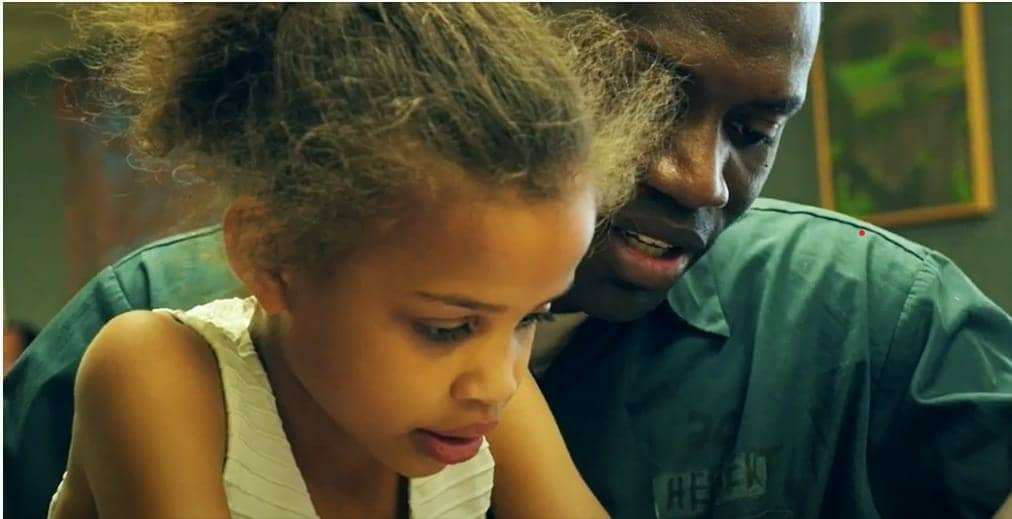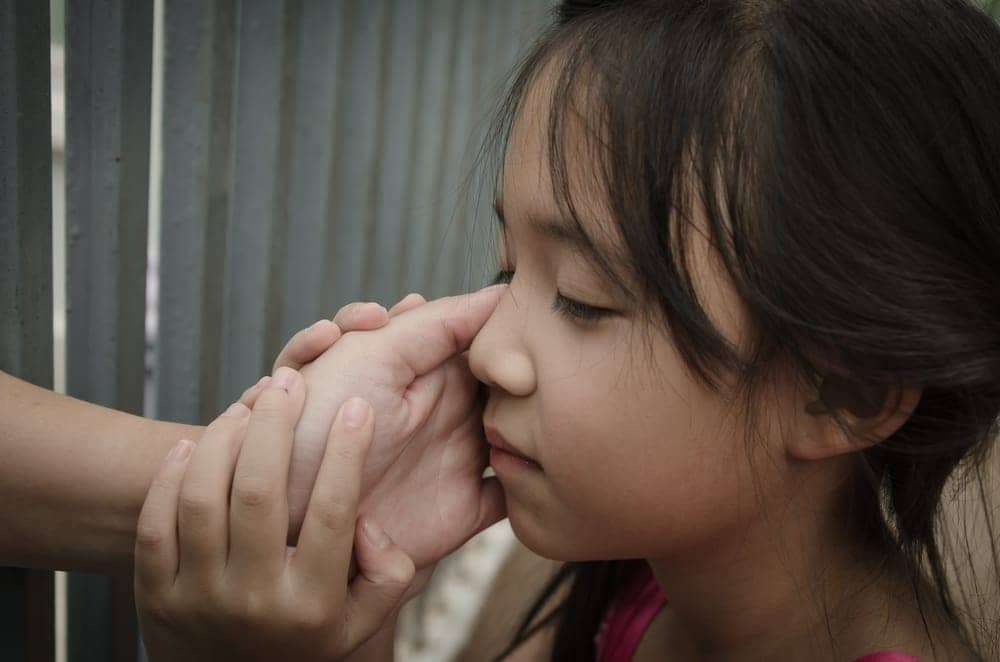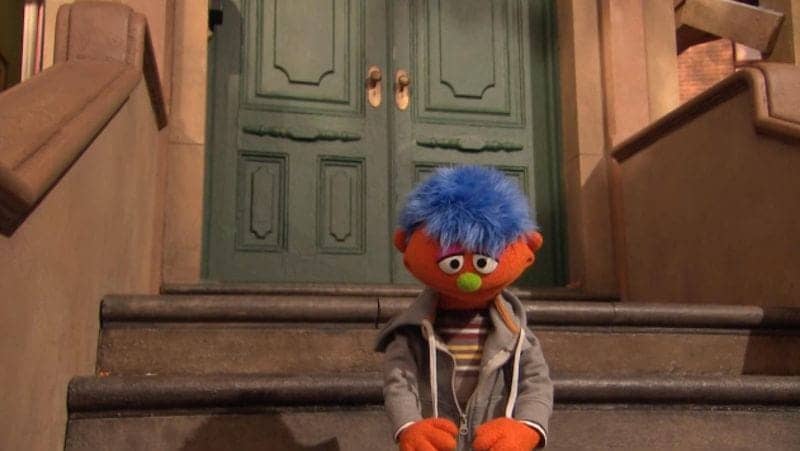
by Diana Hembree
Parenting sometimes feels overwhelming, but it can be hellish if you’re a parent doing time – especially in the United States.
Maybe you learn your 2-year-old daughter kisses the phone after she talks to you, and you want to hug her so badly it hurts. But when you finally see her, all you can do is touch the tips of your fingers to hers on the thick pane of glass that separates you.
Maybe your teenage son is distant and sullen. You want to put your arm around him and whisper that when you get back, the first thing you’ll do is take him fishing off the pier.
Or maybe you’ve been moved to a prison in another state and your family can only afford to visit once a year, if at all. Your wife tells you the children cry out for you in their sleep.
Our mass incarceration system doesn’t just punish the person sent to prison, it punishes children as well. Half the men locked away in prison or jail today are parents, as are 80 percent of women in jail. The children of these parents are likely to experience trauma and toxic stress from their parent’s incarceration, according to an article in Pediatrics Nationwide.
Left unaddressed, having a parent behind bars raises the risk of learning and behavior problems in childhood and serious diseases in later life. Like child abuse, “parental incarceration has been classified as a particularly stigmatizing Adverse Childhood Experience, or ACE, disproportionately impacting children of color and children in poverty,” the researchers wrote.
Finland requires that the courts consider the best interests of a child whose caregiver is being sentenced “in every stage of the process.” U.S. government guidelines do the exact opposite: They advise judges not to consider the best interests of children when sentencing a parent.
All things considered, the U.S. criminal justice system may be the world’s most punitive and destructive to families – especially for families of color. It routinely separates mothers from young children after sentencing. It imprisons more people per capita than any other country. And our justice system – steeped in the legacy of slavery – is so racially discriminatory that approximately one in four African American children have or have had a parent in prison. Nationwide, Black children are six times more likely to have had a parent in prison.
Other countries don’t just imprison people at a far lower rate: They take parenting into account when sentencing. Sweden tries to “avoid” the incarceration of its civilians whenever possible. Kyrgyzstan suspends the sentences of women who are pregnant or have children until their children turn 14. For crimes that are not considered serious, Columbia offers mothers of minor children house arrest instead of imprisonment and extends that to fathers if the mother is absent.
Going a step further, Finland requires that the courts consider the best interests of a child whose caregiver is being sentenced “in every stage of the process.” U.S. government guidelines do the exact opposite: They advise judges not to consider the best interests of children when sentencing a parent.
The prison system also makes it unconscionably difficult for parents and children to keep in touch. As many of you know from experience, the system makes little or no effort to keep incarcerated parents near their families, often locating them in remote rural areas or even another state – one family paid $2,730 for a single visit to a prison in Hawaii.

Loved ones may find their mail returned because prisoners have been moved abruptly to another facility. Phone calls home are ridiculously expensive, especially if they are made from a jail. And even if your family is allowed to visit, children often have to talk to you through glass or mesh screens, unable to hug or even touch. The COVID-19 epidemic has hit prisons especially hard, putting residents’ lives at risk and making it still harder to keep in touch.
Despite these staggering obstacles, there is perhaps no more important work you can do in prison than to stay as close as possible to your children. They need you. You need them.
Some prisons are so full of horror that in your calls and letters you may feel like the Jewish Italian father at Auschwitz in the film “Life Is Beautiful,” who tries to keep up the spirits of his small son by pretending that the concentration camp in which they are prisoners is simply part of a safe, elaborate game.
Despite the degradation you may have gone though, nurturing your children will feed your soul. Here are some ways to strengthen that over-arching bond:
1. Double-down on calls and letters. Unlike email and text messages, old-fashioned letters from you can be carried around, thumbed over and treasured in private. They won’t disappear if your child changes his email.
If you like to draw, include some sketches or cartoons to make your child laugh. Share stories from your childhood. Ask questions.
Be sure to check with his caregiver about important milestones – a good report card, sports victories, school graduations – so you can call that week if possible. Let your kids know you are proud of them and, if they’re having trouble, that you are rooting for them.
2. Keep writing your family even if you don’t hear back for ages. Sometimes there is an internal snafu. A relative whose husband had spent time in a state prison told me at one point he had been suicidally depressed because he hadn’t heard from any of his friends or family for a long time. He had been writing – sometimes on paper napkins when he ran out of paper – begging for word from home.
She didn’t understand what had happened – she and their son were writing him near daily – but it turned out prison officials had held back the letters for more than three months. She only found out when her husband managed to call her collect. After a pressure campaign from their family, her husband finally received an enormous bundle of old mail.
But even if it is just that your kids are better at texting than writing letters, keep yours coming. Remember, though, that all mail is inspected, and it’s likely anything you write will be read by a prison system employee before it is received.
3. Encourage regular visits from your family. Don’t worry if your children seem shy or nervous at first – seeing the guards or barbed wire may have frightened them. Especially in the first visits, they may also feel a range of emotions, from joy and excitement to anger, fear and guilt.
Be aware that small children often blame themselves and may feel that it is their fault you are there. Assure them they are not to blame and do your best to comfort them and reassure them of your love.
Regular visits with your family, researchers say, is one of the most important steps to a successful “re-entry” into family and community life after you are released.
4. Reach out to the Family Unity Project. The Family Unity Project – part of Legal Services for Families with Children – was created to help prisoners maintain bonds with their family and children. It recognizes that you are not an isolated individual, but part of a larger family: a son, daughter, father, mother, brother or sister. The group has drawn up a Bill of Rights for Incarcerated Parents, which recognizes our mass incarceration system should be dismantled and that parenting while in prison or jail is a basic human right.
Among other things, these rights include being able to develop a relationship with your child, to see your children regularly while incarcerated, and to receive education and support on how to parent from behind bars. Reach out – or have a family member do so – to find out more about your rights.

5. Check out other programs about parenting behind bars. Remember Sesame Street? Well, Big Bird, Elmo, Cookie Monster and the other characters are on your side. The Sesame Workshop, the brainchild of the Administration for Children and Families group, offers a free bilingual English-Spanish toolkit for incarcerated parents and their familiesincluding articles, videos and animations. The toolkit authors recognize that having a parent incarcerated can be overwhelming for children and offer wonderful materials on “simple everyday ways to help comfort a child and guide him or her through these tough moments.”
Other programs include SKIP, Inc. (Save Kids of Incarcerated Parents), a national initiative that offers academic support programs for your kids; the Florida-based Children of Inmates, which pays for Bonding Visits, video conferences and other services in Miami, Jacksonville, Tampa and other parts of Florida; Hour Children, which supports incarcerated women and their children in New York State; Parenting Inside Out in California, an evidence-based program that helps parents develop parenting skills; and Foreverfamily, an Atlanta-based organization that offers family visits, online yoga, virtual learning sessions and (pre-COVID) school enrichment programs, summer camps and leadership sessions for children of incarcerated parents.
Rather than building new prisons and jails, correctional facilities should focus on education and preparing residents for success outside the prison walls.
6. Read a storybook to your child. Read to Me, a national program, is one of a dozen that records incarcerated parents reading a storybook and sends the recording to their children along with the book; it can also arrange for parents to read the same book during a family visit. Other programs include Heart Bound Ministries of Georgia, which helps incarcerated parents make videos of themselves reading and The Storybook Project of Arkansas.
The Children’s Literary Foundation (CLiF) started a program called Children of Prison Inmates, which has created reading rooms for incarcerated parents and their families in Vermont and New Hampshire. In a CLiF video, one young, incarcerated father reports proudly that his small daughter is learning how to read with books from the program. Pausing to kiss her on the top of her head, he said, “This event is just awesome – you couldn’t ask for anything better.”
7. Take advantage of educational opportunities, if any, in your facility. Studies have also linked “the discriminatory incarceration of African American parents” to their children’s lower performance in school, which can undermine later-life success, according to researchers at the Economic Policy Institute. “Simply put, our criminal justice system makes a significant contribution to the racial achievement gap” in school and later-life success, researchers wrote.
Rather than building new prisons and jails, correctional facilities should focus on education and preparing residents for success outside the prison walls. Before the COVID-19 pandemic struck, San Francisco County Jail No. 2 offered classes on child development, while San Francisco Jail No. 5 was teaching Urban Agriculture Aquaponics, “fish farming,” to us laypeople, literature, geometry, U.S. government and English as a second language. Talking about the classes with your kids will also set a good example for them.
8. Support your children’s caregiver. It’s wonderful if you have a loving partner on the outside; you can be a support for him or her in her hard work of solo parenting. Nonetheless, even the most understanding partner can feel exhausted, overwhelmed and bitter at having to be a single parent, especially if money is tight. Try not to take it personally: Give your partner props for all the hard work they are doing and ask how you can support them. Also, talk about the kind of future you want together, even if it seems far away.
9. Be diplomatic with your ex if you are divorced or estranged. The University of Missouri has a guide for communicating from prison with your former spouse, if he or she sometimes gets on your last nerve:
“Discuss co-parenting details in a calm, friendly and pleasant manner. Listen patiently when the other parent is speaking. Demonstrate your understanding and respect for their opinions and suggestions … Be sensitive to what is said between one another and in front of the children. Do not put children in the middle of arguments or discussions. Children do not want to hear bad things said about either parent.”
“As a caregiver, you know the traumatic and emotional impact on the rest of the family when a parent goes to prison.”
If you do have an argument, try to resolve it as soon as possible after you calm down.
For the caregivers of a loved one in prison
First, give yourself a hug and affirmations for taking on the Herculean job of providing for your kids during this tough time. If your parents aren’t nearby, try to grow a network of trusted friends and relatives who have your back. You may also want to check out groups like Strong Prison Wives and Families – “You are the rock of this family” – or another online group for prisoner’s wives, husbands, girlfriends or boyfriends, partners and family.
“As a caregiver, you know the traumatic and emotional impact on the rest of the family when a parent goes to prison,” the non-profit Prison Fellowship has written. “Not only is it difficult for the children, it can also be overwhelming for those of you left to care for the children. You might have to work more hours, change residences, make more sacrifices and struggle with feelings of anger, hurt and resentment. [But children need] the loving support of their parents … Children want to know they’re not forgotten – because they haven’t forgotten their parents. And your efforts could encourage a supportive relationship that benefits everyone in the family.”
The non-profit encourages you to update your partner on the children’s milestones; show respect for him or her; encourage your children to write letters and send drawings; remind them that imprisonment is not their fault; and visit as often as possible post-COVID. After we’re all vaccinated for the coronavirus, check to see whether your prison has any programs for families of prisoners, such as reading events or a camp day in which they can be outside together.
As you doubtless know, the prison industry is notorious for price-gouging on visits and collect calls. One remote prison visit can cost from $250 to several thousand dollars if your partner is incarcerated in another state, so check for non-profits in your state that fund family visits. If none are available, consider a GoFundMe.
Mass protests over police violence against African Americans and the Black Lives Matter movement are forcing some changes. If you are frustrated with the conditions for incarcerated parents and their families, consider joining the movement to transform our criminal justice system.
Pressure your government officials about an early release for your partner and other prisoners, given the COVID-19 emergency in the jails and prisons. Join the mailing list of places like the Prison Policy Initiative, the Equal Justice Initiative, The Marshall Project and other non-profits working to dismantle mass incarceration, discriminatory sentencing and the death penalty. But most important: Keep your family bonds alive.
References
Paurus, M. International Report on the Conditions of Children of Incarcerated Parents: A Survey of Prison Nurseries. University of Minnesota.
Porter B. Incarcerated Parenting: How Family Relationships Can Be Beneficial. Murray State University. December 12, 2018.
Sawyer, W., and Wagner, P. Mass Incarceration: The Whole Pie 2020. Prison Policy Initiative.
Sesame Street in Communities: Coping with Incarceration.
Schapiro, D. American Civil Liberties Union. Price-Gouging in Prison. August 2010.
Schramm, D., and Pucci, C. Parenting from Prison: A Co-Parenting Guide for Divorced and Separated Parents.
Diana Hembree is a former science writer for the Center for Youth Wellness. She is an award-winning journalist who has worked at Time Inc., the Center for Investigative Reporting and the Energy Bioscience Institute and has written or edited for Forbes, HealthDay, the Washington Post, PBS Frontline, Vibe and many other places. She can be reached via editor@sfbayview.com.





